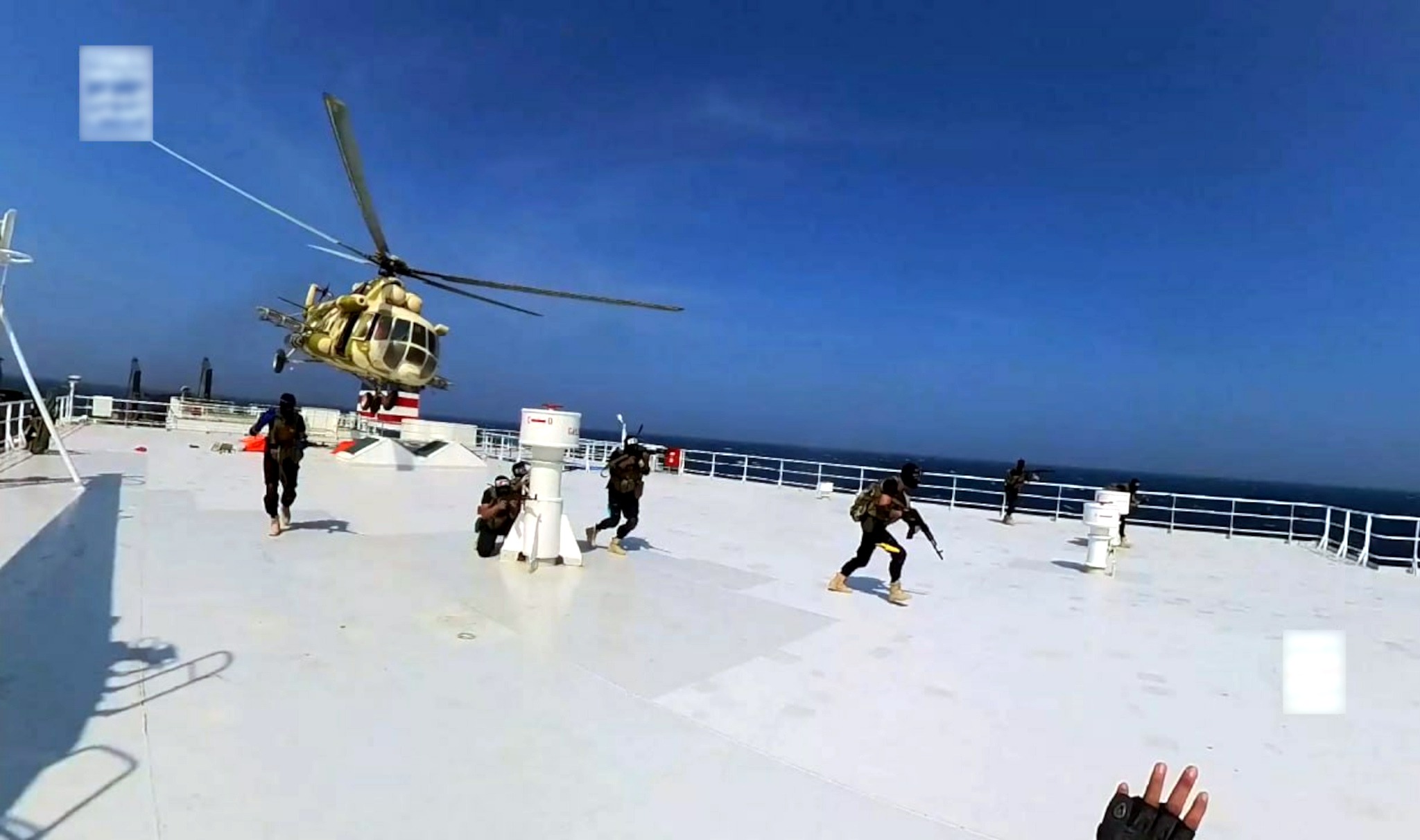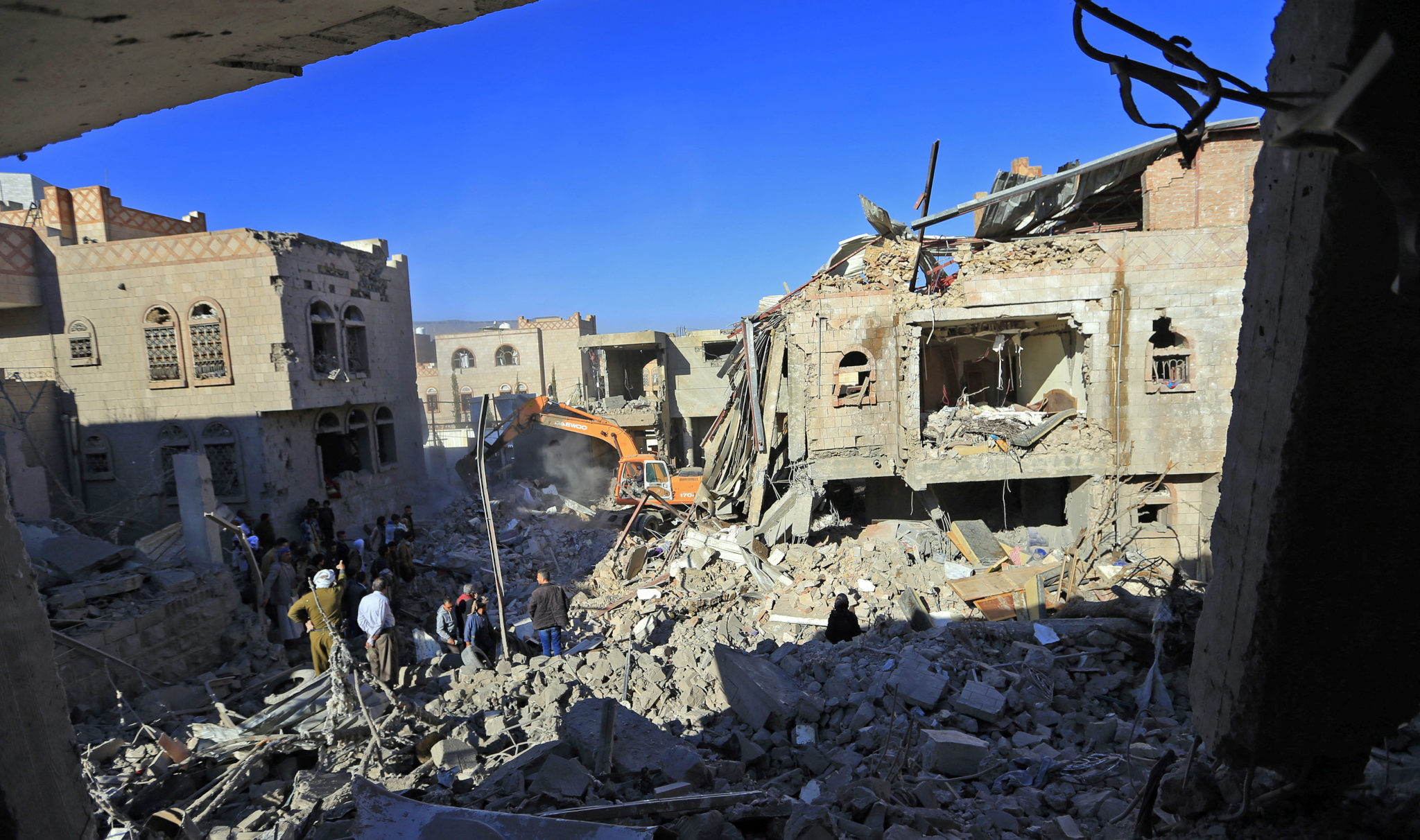Drones, anti-ship ballistic missiles and a helicopter-led hijacking are just some of the recent tactics deployed by Houthi forces in Yemen against maritime traffic in the Red Sea.
The Houthis have pledged to target “all ships in the Red Sea bound for Israeli ports, regardless of their nationality”. Attacks, they say, will continue until Gaza receives the food and medicine it needs.
They are certainly having an impact. Since December 15, following a drone and ballistic missile strike on two merchant vessels, four of the world’s largest shipping companies – representing over 50% of global container shipping capacity – have suspended voyages through Bab al-Mandeb, the narrow gateway at the southern tip of the Red Sea.
Israeli cargo shipping company, ZIM, had already announced the rerouting of its fleet from the Red Sea to the much longer journey around the Cape of Good Hope. Yesterday, oil giant BP also declared a pause for all its tankers travelling through the region.
The most recent disruption followed a Houthi-manned helicopter landing on the deck of the British-owned, Israeli-linked, Galaxy Leader, on November 19. The cargo ship and its crew are still being held in the Houthi-controlled port of Hodeidah on Yemen’s western coast.
This weekend, HMS Diamond took out a Houthi-launched drone, the first aerial target shot down by the Royal Navy since the Gulf War in 1991. The missile used is estimated to have cost up to £2m, versus a drone that might be a hundred times cheaper to produce.
With numerous Red Sea suspensions being declared by shipping companies, last night U.S. defence secretary Lloyd Austin announced Operation Prosperity Guardian, a “multinational security initiative” to protect shipping against Houthi attacks.
The naval coalition includes Britain alongside Bahrain, Canada, France, Italy, the Netherlands, Norway, Seychelles and Spain. A naval convoy for vessels – a protection measure not used since the so-called “Tanker War” of the 1980s in the Persian Gulf – is a likely option for the new coalition.

Where did the Houthis come from?
The Houthis’ military capability has dramatically transformed since their emergence from a 1990s Zaydi Shia revivalist movement, the Believing Youth. It was a response in part to the Saudi-funded spread of Salafism in Yemen.
In 2004 the killing by Yemeni security forces of parliamentarian and Believing Youth founder, Hussein al-Houthi, sparked the first of six wars between the state and the Houthis. During Yemen’s revolution in 2011, the Houthis downed their weapons to join peaceful anti-government demonstrations that eventually led to the end of more than three decades of rule by President Ali Abdullah Saleh.
In a classic Yemeni-style plot twist, their former foe Saleh and his military loyalists formed an alliance with the Houthis in 2014 in a bid to claw back power. After battling their way through three governorates and laying siege to a major military base in the capital, the Houthis seized power in a coup facilitated by the former president. The “rag-tag militia” had come of age.
Six months later, in March 2015, Saudi Arabia stepped in and led a military intervention against the Houthis in support of the ousted Yemeni government. The Saudis would receive extensive military support from the US and UK, with the latter’s largest arms firm BAE Systems heavily involved in maintaining its air force.
In parallel with the Houthis’ rise came growing sponsorship from Iran. What started as political support morphed and from 2014 accelerated into military cooperation including weapons supplies, manufacturing and training.
Before 2014 the Houthis would have lacked the capability, weaponry and know-how to carry out the recent attacks in the Red Sea. Renamed replicas of Iranian produced missiles and drones flaunted in military parades in Sana’a are now central to the Houthi arsenal.
They have become a key member of the Iranian-led Axis of Resistance, demonstrating their value to the anti-Western, anti-Israel coalition with their escalation in the Red Sea. A poll of Palestinians published last week found Yemen’s response to the war with Israel was the most popular out of all regional actors.
Awkward history
While their military prowess has advanced, the ideology espoused by the group’s hardliners harks backwards, back to a time of theocracy when northern Yemen was ruled by a Zaydi imamate from the ninth century up until the civil war of the 1960s.
In that conflict British special forces embedded themselves within the imam’s troops to train and support them in their fight against a Yemeni republican army backed by tens of thousands of Egyptian soldiers. Britain wasn’t alone. Saudi Arabia and Israel also sponsored the Zaydi imam’s fighters against the Egyptians and the republican cause.
Israel’s clandestine support through Saudi Arabia had the ulterior motive of keeping the Egyptian army bogged down in Yemen – some 26,000 Egyptian troops died in north Yemen’s civil war. This left Israel well-placed to launch their short but successful Six-Day war in 1967, during which Israel seized the Sinai Peninsula and the Gaza Strip from Egypt – an inconvenient aspect of their ancestor’s history which the Houthis won’t wish to highlight.
Despite Saudi, British and Israeli backing, the Yemeni civil war brought to an end the Zaydi imamate in 1970. Houthi rule in northern Yemen since 2014 has meant a resurgence of policies not seen since the old imamate, favouring Hashemites (descendants of the Prophet Mohammed) at the expense of traditional tribal norms, severely restricting women’s rights, and zero tolerance for dissent or criticism.
Red Sea blockade
Egypt – a member of the Saudi-led coalition against the Houthis – is again facing the prospect of another bloody nose from Yemen’s Zaydi fighters. This time it’s likely to come in the form of a financial blow to the Suez Canal.
Since the Houthi attacks escalated in the Red Sea last month, 78 vessels have reportedly delayed journeys through the Red Sea with a further 48 ships diverting away from the Suez route altogether. Tolls through the canal amount to around $500,000 per vessel.
Although the current disruption is still relatively minor to the 12% of global trade that travels the Red Sea/Suez route, if Houthi attacks continue at the daily rate seen over recent days the economic hit to Egypt will become impossible for Cairo to ignore.
The Houthis’ stance against Israel and in support of the Palestinians has proved widely popular. Beyond the large Houthi-organised pro-Palestine protests in Sana’a and smaller gatherings across Houthi controlled territory, the effectiveness of the maritime attacks has garnered admiration even amongst the anti-Houthi side in Yemen’s current conflict.
Anti-Israeli, anti-American and anti-Jewish rhetoric has long been a Houthi norm. The decades-old mantra “Death to America, Death to Israel, Damn the Jews, Victory to Islam”, is the Houthis’ red and green slogan that’s mounted on flags, painted on mountainsides and chanted by its supporters.
The emergence of Israel as a renewed foreign enemy to replace Saudi Arabia has proved timely. A March 2022 ceasefire ended the Saudi-led air war against the Houthis and reduced frontline fighting.
Domestic governance issues have been on the rise with swift crackdowns on protests ahead of a planned restructuring of the state to consolidate Houthi power. A political crisis was unfolding in the months before the October 7 Hamas attack.
A popular cause to rally around with another American-backed foreign enemy is a distraction that will also be a relief for Houthi authorities. At stake domestically is the welfare of tens of millions of Yemeni civilians and a political settlement to end the nine-year-long war with Saudi Arabia. The Red Sea disruption has already impacted maritime insurance and consequently shipping costs.
High stakes
For Yemen, which imports up to 90% of its food and goods, the knock-on effect of rising food prices may be dire. Almost 70% of Yemenis rely on humanitarian aid and earlier this month the UN’s World Food Program announced a suspension of aid in Houthi territory after failing to reach an agreement with the Houthis on its operations.
Yemen is still struggling to recover from near-famine conditions as a result of the de-facto blockade imposed by Saudi Arabia over the course of the conflict. Yet it is Saudi Arabia who has called on the U.S. to show restraint in their response to Houthi maritime attacks.
In the weeks leading up to October 7 there was much anticipation of an imminent deal being signed between the Houthis and Saudi Arabia, a deal that the Saudis are increasingly desperate to sign and the Houthis may calculate they can walk away from with minimal consequence.
The result of the Houthis’ Red Sea attacks may not be immediately obvious, or in line with their stated aims of harming Israel. Shipping stocks have risen since December 15. The share price of Israeli-owned ZIM rose 18 percent at the end of last week.
Maersk, who also suspended Red Sea travel, is a transporter for the U.S. Department of Defense. It is integral to U.S. military logistics and saw its stock close up eight percent.
On Monday, in a fresh statement from Yemen, the Houthi armed forces claimed two more maritime attacks in the Red Sea. The Houthis have come out on top territorially, politically and militarily from a decade of fighting in Yemen. In the process they were bombed, sanctioned and blockaded.
They are the Axis of Resistance member gathering prowess and popularity in the region. In weighing up how far to take their stance against Israel and its allies by targeting international shipping, they may calculate there’s still more to gain.




